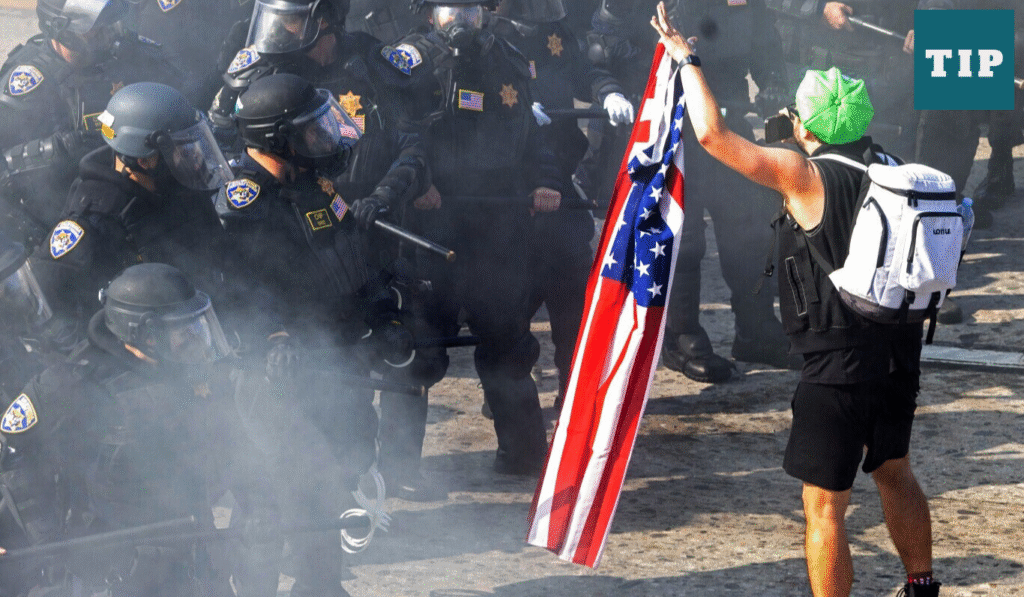Why the Protests Began in Los Angeles and What Trump’s Insurrection Act Means
The recent immigration raids in Los Angeles have ignited a firestorm of protests, civil unrest, and political backlash. The situation escalated after federal agents detained 44 undocumented immigrants, triggering widespread outrage across the city. In response, protests erupted, some turning violent, resulting in over 400 arrests and a temporary citywide curfew.
President Donald Trump’s reaction has further fueled tensions. He deployed 2,000 National Guard troops and threatened to invoke the Insurrection Act of 1807, which would allow him to use active-duty military forces on U.S. soil to suppress unrest.
Key Concerns:
- The Insurrection Act could enable a military crackdown on civilian protests.
- Immigrant communities in Los Angeles may face increased surveillance and fear.
- Local leadership strongly opposes Trump’s actions, calling them provocative and harmful.

How It All Started: Immigration Raids in Los Angeles
The chaos began when U.S. immigration authorities carried out a series of detention operations in Los Angeles, targeting individuals without legal residency status. In total, 44 people were detained, many of whom had been living and working in the U.S. for years.
These actions were seen by local communities and immigrant rights groups as excessive and unjust. Many accused federal agents of separating families and acting without proper warrants or public notice. The community’s frustration soon spilled onto the streets.
Protests Erupt: Community Demands Justice
Almost immediately, thousands of protesters took to the streets, demanding an end to the raids and calling for immigration reform. What began as peaceful demonstrations quickly escalated due to increased police presence and aggressive crowd control tactics.
Despite warnings from officials, the protests grew, both in size and intensity, leading to widespread arrests, property damage, and shutdowns in key areas of the city.
Law Enforcement Crackdown: 400+ Protesters Arrested
As the protests entered their sixth consecutive day, law enforcement agencies ramped up their response. More than 400 individuals have been arrested since the unrest began. Charges range from unlawful assembly and vandalism to resisting arrest.
A citywide curfew was imposed by Mayor Karen Bass, effective from 8 p.m. to 6 a.m., in an attempt to control the situation. However, the curfew did little to stop the demonstrations and was eventually lifted.
Protests Spread Nationwide: A Ripple Effect
The unrest in Los Angeles has inspired similar protests in cities across the United States, including:
- Austin, Texas
- Chicago
- New York City
- Dallas
- Denver
These protests have largely remained peaceful, but they reflect a growing national frustration with the government’s immigration policies and its treatment of undocumented individuals.
Trump’s Tough Talk: Deploys National Guard, Threatens Military Force
In response to the protests, President Trump ordered 2,000 National Guard troops to be stationed in Los Angeles. His message was clear:
“Illegal immigration will not be tolerated. We are restoring law and order.”
He further warned that if the protests continue, he is prepared to invoke the Insurrection Act, a federal law that permits the use of military force on American soil during times of civil unrest.
What Is the Insurrection Act and Why Is It Controversial?
The Insurrection Act of 1807 allows the U.S. President to deploy active-duty military in the country when state governments are unable or unwilling to suppress rebellion or lawlessness. Although rarely used, it has been invoked during moments of severe domestic tension, such as:
- The 1992 Rodney King riots in Los Angeles
- The civil rights movement of the 1960s
If enforced in Los Angeles:
- Active military troops could replace or support local law enforcement.
- Civil liberties, such as freedom of assembly, may be curtailed.
- Immigrant communities may face increased targeting and fear.
Legal experts warn that invoking this act now could inflame tensions and violate constitutional rights.
State and Local Leaders Respond: “This Is Not the Way”
California Governor Gavin Newsom and Los Angeles Mayor Karen Bass have openly criticized Trump’s actions. Mayor Bass declared:
“Raids do not bring peace — they bring pain. The solution is not troops; it’s real reform.”
She emphasized the need for a humane and fair immigration policy, not military intervention. The city has refused to cooperate with the federal raids, citing concerns over legality, public safety, and community well-being.
Voices from the Community: Stories of Fear and Hope
Amid the protests, many personal stories have surfaced, shedding light on the real impact of the raids.
Maria Gonzalez, a resident whose husband was detained, said:
“He’s lived here for 15 years. He pays taxes and supports our family. This isn’t justice—it’s cruelty.”
Kevin Marks, a schoolteacher and protester, added:
“We’re not just standing up for immigrants—we’re standing up for what’s right.”
These stories are a stark reminder that real lives are being affected, not just policy headlines.
America at a Crossroads
The recent events in Los Angeles are not isolated—they are part of a larger national reckoning with immigration, civil rights, and federal overreach. With more than 400 arrests, protests spreading nationwide, and the potential use of military force against civilians,
Also Read: MS Dhoni Joins ICC Hall of Fame: A Legendary Journey Honoured on the Global Stage